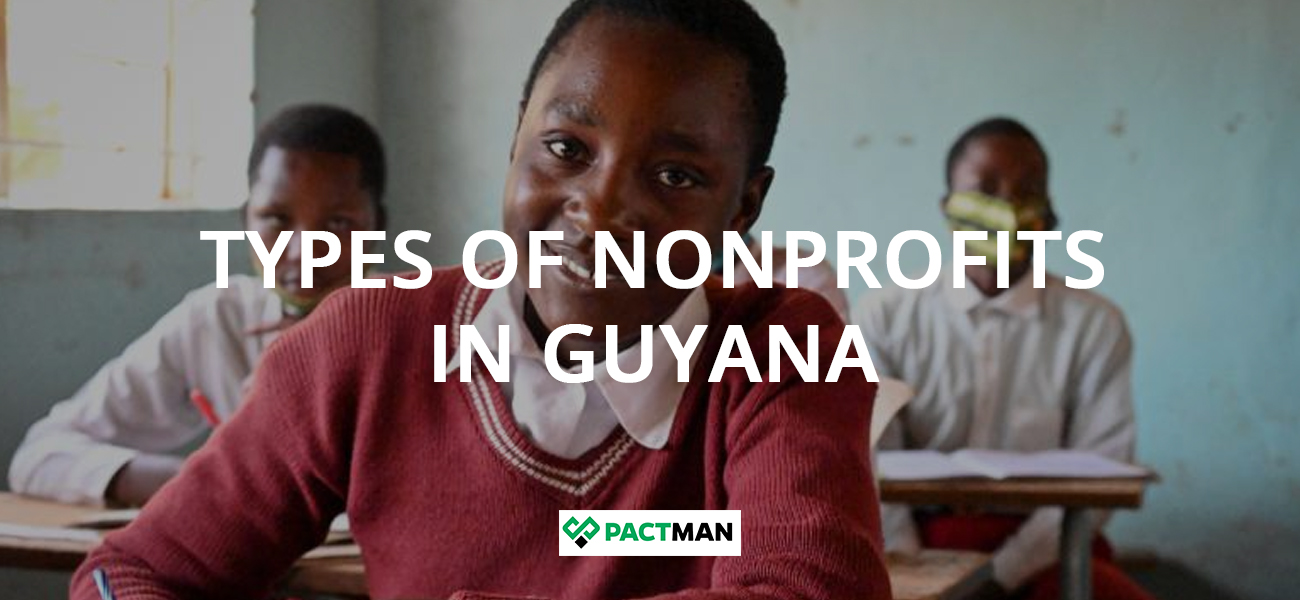In Guyana, the nation’s ethnic groups and cultural history have influenced the development of various types of nonprofits. Early in the history of the nation, ethnic groups were geographically separated. Likewise, this fueled ethnic divisions that have lasted through the present.
Some of Guyana’s first nonprofit organizations were founded by free laborers. Even so, the first organizations were forerunners of trade unions, associations created to help their working-class members in times of need.
In this article, we will consider the various types of nonprofits in Guyana and their operations.

- Nonprofit entities in Guyana largely contribute to combating floods, AIDS, poverty, and prejudice – both real and perceived.
- There is yet to be a legal framework that supports the development of nonprofits in Guyana.
- Nonprofits in Guyana altogether lack any form of public reporting or accountability.
What are the types of nonprofits in Guyana?
The Civil Law Act of Guyana, which was passed in 1916, defines the various types of nonprofits according to English law.
1. Company Limited by Guarantee
These types of nonprofits constitute more than twenty-person associations, partnerships, societies, bodies, or other groups formed to engage in a particular objective. However, a company limited by guarantee must be incorporated under the Companies Act before it can begin operation.
Accordingly, the members of these nonprofit entities must sign on as guarantors and promise to pay the “guarantee value,” which is determined at incorporation. Likewise, any or all of the bylaws listed in the Third Schedule may be adopted by a company.
Additionally, the parties involved cannot remove the business’s profits as shareholders might in a company limited by shares. Hence, a company limited by guarantee is frequently referred to as a “not-for-profit” or “charitable corporation.” Any profits generated by the corporation are reinvested in the organization.
2. Cooperative Societies
The Cooperative Societies Act facilitates the establishment and control of these types of nonprofits. Equally, this Act lays out rules for the formation, registration and operation of cooperatives, among others.
By and large, cooperatives are established when two or more people collaborate to achieve a common objective. Presently, in Guyana, there are numerous recognized cooperative societies. These organizations strive to improve the standard of living of their members.
In general, a cooperative society can be formed by any group of seven or more people. The Registrar of Co-operatives constitutes the governing body for registration. To this end, no individual or group of individuals should refer to their enterprise as “co-operatives” unless it has obtained legal registration.
Co-operatives were established in Guyana to encourage Guyanese to participate in decision-making and advance the country.
3. Trusts
The National Trust Act of 1972 governs these types of nonprofits in Guyana.
A charitable trust enables the transfer of assets to a charity or tax-exempt organization of choice. Furthermore, it offers several tax advantages to assist in the reduction of any potential tax liabilities. Above all, charitable trusts can be set up to allow for a consistent income stream for a predetermined amount of time.
The first legally recognized form of nonprofit was a charitable trust. This is because the assets in the trust must be irrevocably donated to a charity purpose. Besides, only irrevocable trusts are permitted to be charitable trusts.
4. Friendly Societies
The Friendly Societies Act sums up the rules for the creation, filing, incorporation, and administration of these types of nonprofits.
Friendly Societies are established to provide for the relief or maintenance of the members. This also includes their wives, husbands, children, fathers, mothers, brothers, sisters, nephews, nieces, or wards. The assistance is to aid members during sickness or other infirmities, whether physical or mental.
Upon registration, a society automatically transforms into the legal entity known by the name given in the acknowledgement of registration. Likewise, it obtains the right to acquire, receive, own, hold, mortgage, and otherwise deal in real estate. All these must however be subject to society’s rules.
In registering a friendly society, the Registrar must receive a written application from at least seven people. The Act also requires that at least seven members, including the secretary, must sign the application.
What is the Regulatory Framework that governs nonprofits in Guyana?
It should be noted that there is no legal framework that supports the development of the various types of nonprofits in Guyana. Likewise, tax regulations work to hinder charitable donations. Although, since the Companies Act was passed in 1991, some kind of charity laws have been promised, Guyana currently lacks them.
Also, the terms “charity” and “not-for-profit” are frequently used interchangeably and improperly, respectively. However, a charity may incorporate itself under the Companies Act or Friendly Societies Act among others. This in turn places them under some type of regulatory oversight and, hopefully, results in some degree of corporate governance. Equally, this is in addition to the form that is done by the legislature.
By and large, all of these organizations consistently solicit donations from the public. Undoubtedly, many of them carry out excellent work. However, this hardly suffices to excuse the complete lack of any form of public reporting or accountability. To begin with, some of these entities conduct themselves as self-sustaining oligarchs. Hence, there is no misgiving or sense of duty to disclose their activities to the public or to those from whom they solicit donations.
Conclusion
The various types of nonprofits in Guyana have contributed to the development of the nation. Some of these entities largely contribute to combating floods, AIDS, poverty, and prejudice – both real and perceived. Others also offer legal aid and affordable meals for the underprivileged.
There is however need for more accountability and transparency in the nonprofit sector. By being more open about the utilization of their resources, nonprofits can gain the trust of the community and attract more donors.
If you enjoyed reading this article, please share your comments and suggestions with us at the bottom of this post.


